4. Shrikrushna highlighted the difference between Bhogabhumi and Yogabhumi by showing to the lady-seeker the prosperous region of Heaven
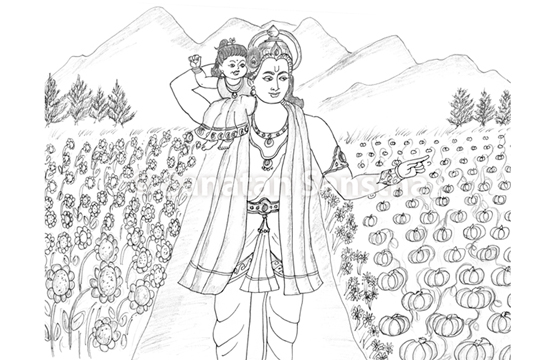
4 A. Inability to draw a single picture exhibiting balakbhav due to
covering of distressing energy and feeling of loneliness in the new place,
and after earnest request of lady-seeker to Shrikrushna, He brings to her notice
that though He is with her every moment, she is not aware of His existence
‘For almost a week since arriving in USA at my daughter’s house, I had not performed spiritual remedies (Note). As a result, a covering of distressing energy developed around me. Hence, I could not draw a single picture exhibiting balakbhav. Since I was alone in a new place, I requested Shrikrushna earnestly. He made me realise that though He was with me every moment, I was not aware of His existence.
4 B. Explanation of the picture
1. Realisation of generosity and the attitude of unrestrained gifting
In the picture, I sat on Shrikrushna’s shoulder and was moving around when on one side I saw a rich crop of pumpkins & on the other side, a rich farm of sunflowers. From this, I realized the generosity of mother earth and attitude of unrestrained gifting.
2. Pumpkins are given weird shapes and used in Halloween festival, which attracts negative energies
The Halloween festival that is celebrated in western countries attracts negative energies; pumpkins are given weird shapes and then used. (The westerners celebrate ‘Halloween’ or ‘All Hallows Eve’ on 31st October. During this festival, houses are decorated with lanterns made by carving pumpkins into scary faces. People wear weird and frightening clothing. On this day, they indulge in activities such as frightening others, narrating horror stories, watching horror movies or visiting places possessed by ghosts. – Compiler)
3. Shrikrushna narrating the difference between Bhogabhumi and Yogabhumi
In this picture, Shrikrushna showed me the Bhogabhumi (Land where one completes all the sufferings as per the destiny) of westerners where there is prosperity everywhere. In other words, He showed me the Heaven which is prosperous with many means of happiness. He, thus, told me the difference between Heaven which leads an individual to the path of Pravrutti (Tendency towards worldly pleasures) and the Holy land of Hindus which leads an individual to the path of Nivrutti, meaning, the Yogabhumi (Land where one performs spiritual practice).
Bhogabhumi (Land of
|
Yogabhumi
|
|
|
1. Environment |
Raja-Tama-predominant |
Sattva-predominant |
|
2. Life-style |
Predominance of Raja-Tama in all aspects such as food, attire, language |
All aspects such as food, attire, language are Sattva-predominant |
|
3. State of mind |
Mind is attracted towards all comforts of life, and it increasingly gets entrapped in materialistic life |
Since no comforts are available, the mind learns to adjust to every situation and as a result, it slowly moves towards Spirituality |
|
4. Satsang |
Chances of getting satsang are next to impossible |
The spiritually curious easily get satsang |
|
5. Birth of Saints |
Does not take place |
It is the birth place of Sages and Seers, Saints and Incarnations |
|
6. Sect / Dharma |
A. Sects are established by man |
‘Sanatan Dharma’ is established by God; hence, it is always new and is eternal, meaning, it has no beginning and end |
|
B. This sect, which is followed by people is not all-encompassing, meaning, it is not expansive and has limitations |
Sanatan Hindu Dharma is not merely a religion but is a way of life and it is all encompassing, vast and expansive |
|
|
7. Benefits / harm due to Holy / Religious festivals |
Not attaching spiritual importance to celebrating festivals leads to negative energies attacking through the medium of festivals |
Every religious and Holy festival has an underlying spiritual importance; hence, the people benefit spiritually |
|
8. Life heads towards |
Pravruttimarg (Path of participating in worldly affairs) |
Nivruttimarg (Path of cessation of participation in worldly affairs) |
4. Other aspects noticed
A. The partly dried coriander leaves of smaller size available in Bharat have greater fragrance than the fresh coriander leaves of bigger size available in western countries.
B. The squirrels in western countries are bigger in size than those seen in Bharat; however, the three strips of golden colour on the back of Bharatiya squirrels (caused by Shriram’s loving touch) are not seen on the backs of western squirrels.’
– Mrs Uma Ravichandran, Chennai, Tamil Nadu. (1.10.2012, 4 a.m.)
4 C. Special features of the picture
‘An ordinary seeker who has a little accumulated merit but who honestly strives hard for God-realisation is dearer to God than one who has lots of accumulated merit but is engrossed in enjoying materialistic pleasures. Instead of remaining engrossed in heavenly pleasures available as per his destiny, if an individual utilises his kriyaman karma (Wilful action) for working hard towards God-realisation, devotion will blossom in his heart. The picture teaches that God likes dasya-bhakti (Devotion of a servitor) performed with sevabhav (Spiritual emotion of service unto the Absolute Truth) more than the sadhana (spiritual practice) performed on the strength of merits.’ (Divine Knowledge received through the medium of Ms Madhura Bhosale, 18.7.2013, 10.50 p.m.)
5. Difference between ‘Navaratri’ celebrations in Bharat
and Halloween celebrated in western countries
 ‘In the month of October, Navaratri festival is celebrated in Bharat and Halloween in USA. I observed some weird aspects in respect of Halloween everywhere in USA. I felt Bhagawan Shrikrushna wanted to teach me something by telling me to study various aspects and also telling me how to remain in a constant learning mode. Through the two festivals celebrated in two different continents, Bhagawan Shrikrushna taught me the following aspects.
‘In the month of October, Navaratri festival is celebrated in Bharat and Halloween in USA. I observed some weird aspects in respect of Halloween everywhere in USA. I felt Bhagawan Shrikrushna wanted to teach me something by telling me to study various aspects and also telling me how to remain in a constant learning mode. Through the two festivals celebrated in two different continents, Bhagawan Shrikrushna taught me the following aspects.
Halloween in USA |
Navaratri
|
|
|
1. Decoration |
||
|
A. Entrance |
Decorated with a wreath, which is normally offered to a dead body |
Is decorated with marigold flowers after drawing rangoli. As a result, waves of Chaitanya are attracted and this prevents negative energies from entering. |
|
B. House |
The house is decorated with Tama-predominant items such as artificial spiders, spider webs, ghosts, tomb-stones, skeleton bones |
The house is decorated with mango leaves, flowers etc. Also, pictures of Deities, devotees and traditional dolls are displayed. |
|
C. Lighting the |
A ripe pumpkin that emits Tama-predominant waves in the environment is carved and a lamp with a weird shape is lit in it |
A ghee (Clarified butter) or an oil lamp that emits waves of Chaitanya in the environment is lit |
|
2. Attire of children |
Tama-predominant attire like a magician, vampire, witch, ghosts, garland of skeletons etc. |
Sattva-predominant attire of Deities such as Shrikrushṇa, Durgadevi or those of devotees such as Meerabai, Dhruva |
|
3. Prasad / sweets distributed to children |
For getting chocolates (which are Tama-predominant and harmful for health), children either cheat or go from house to house and demand |
Prasad is prepared from sprouted grains. It is hygienic as well as Sattva-predominant. |
|
4. Effect |
A. Children imbibe Tama-predominant sanskars |
Children imbibe Sattva-predominant sanskars |
|
B. Since no puja or ritual is performed, the mind remains extroverted |
Various puja rituals performed in this period, so also puja of Deities such as Mahakali, Mahalakshmi and Mahasaraswati makes the mind introverted’ |
– Mrs Uma Ravichandran, Chennai, Tamil Nadu. (6.10.2012)
Note : The remedies performed for removal of distress caused by negative energies are called ‘Spiritual remedies’. To ward off such distress, Sanatan Sanstha recommends some remedies such as praying, chanting God’s Name. Due to such remedies, distressing energy in the individual’s body comes out through belches, yawns etc. (Back)

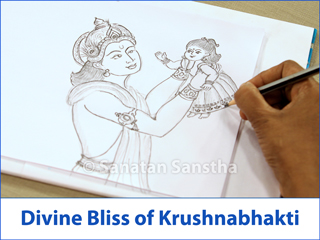 Pictures of Balakbhav bestowing the Divine Bliss of Krushnabhakti
Pictures of Balakbhav bestowing the Divine Bliss of Krushnabhakti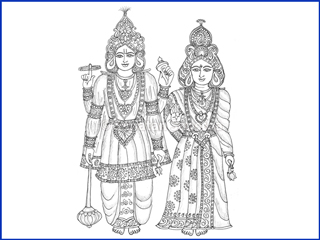 Picture of Shri Lakshminarayan at Jaipur drawn on the day of Ramnavami
Picture of Shri Lakshminarayan at Jaipur drawn on the day of Ramnavami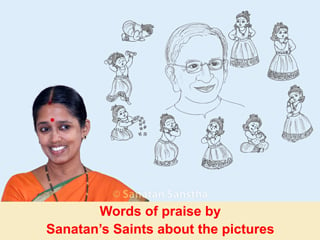 Words of praise by Sanatan’s Saints about the pictures depicting Balakbhav
Words of praise by Sanatan’s Saints about the pictures depicting Balakbhav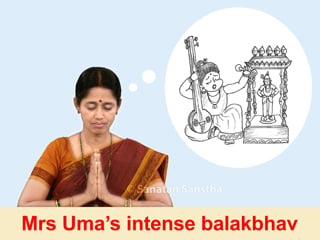 Spiritual experiences of gopis upon seeing the pictures drawn by Mrs Uma
Spiritual experiences of gopis upon seeing the pictures drawn by Mrs Uma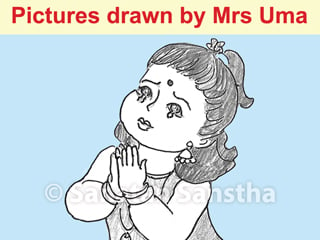 Characteristics perceived by Sanatan’s seeker-artists about pictures drawn by Mrs Uma and associated spiritual experiences
Characteristics perceived by Sanatan’s seeker-artists about pictures drawn by Mrs Uma and associated spiritual experiences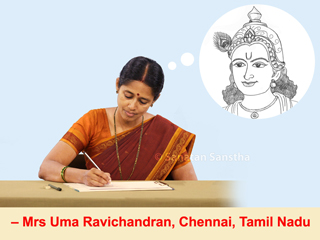 Picture depicting spiritual experience pertaining to H.H. Dr Athavale (Part 2)
Picture depicting spiritual experience pertaining to H.H. Dr Athavale (Part 2)